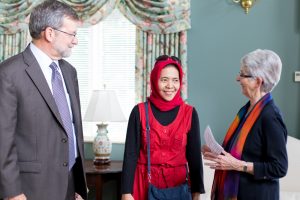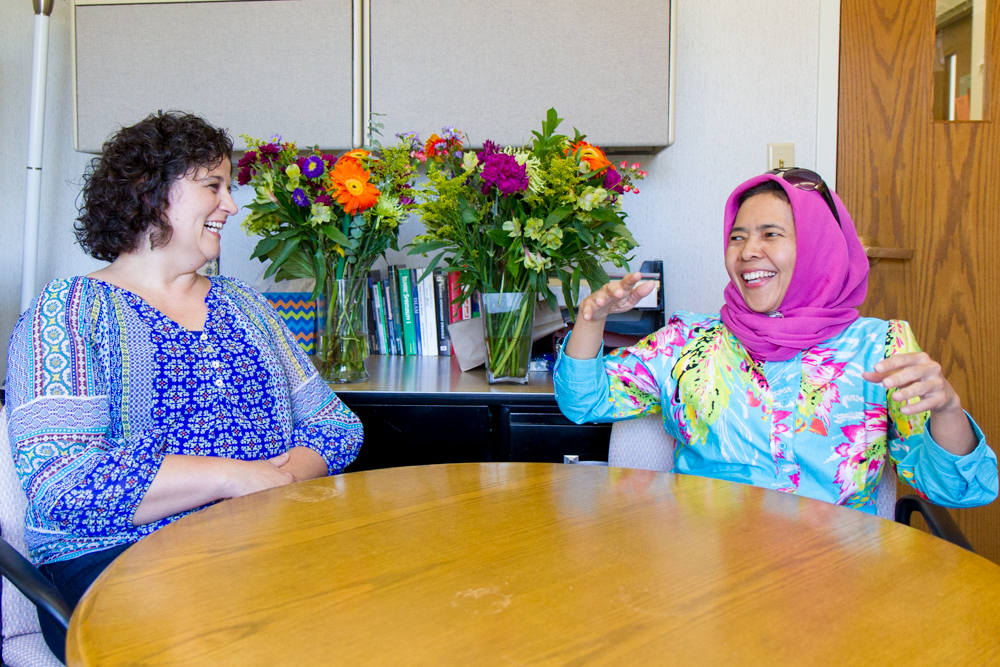Eastern Mennonite University and the Center for Interfaith Engagement welcomes Fulbright Scholar Dr. Syafaatun Almirzanah for the 2016-17 academic year. She is on the faculty of theology in the Department of Religious Studies of State Islamic University Sunan Kalijaga in Yogyakarta, Indonesia.
An expert in interfaith dialogue and Muslim-Christian relations, Almirzanah has a PhD and master’s degrees in theology from the Lutheran School of Theology, as well as a DMin degree from Catholic Theological Union, all located in Chicago, Illinois. She earned an MA in philosophy and a BA in comparative religions at State Islamic University Sunan Kalijaga, Yogyakarta, Indonesia.
Almirzanah is also sponsored by the Henry Luce Foundation, the William and Mary Greve Foundation, and an anonymous donor.
Almirzanah was carefully selected to meet the center’s objectives, says CIE Interim Director Trina Trotter Nussbaum, who coordinated the logistics of the year-long application process with former director Ed Martin. CIE administrators sought a scholar of unique qualifications from Indonesia, the most populous Muslim country in the world.
CIE and EMU last hosted visiting scholars in the 2014-5 academic year. Professor Amir Akrami, of Iran, arrived in September 2012, and his wife, Professor Sedigheh (Sheida) Shakouri Rad came the next year. That three-year visiting scholar program was funded by the Henry Luce Foundation of New York City.
Expert in interfaith dialogue

Almirzanah was highly recommended by Professor Emeritus Lawrence Yoder, with whom she had taught a class at her home university in Indonesia, as well as Georgetown University professor John Esposito, founding director of the Prince Alwaleed bin Talal Center for Muslim-Christian Understanding in the Walsh School of Foreign Service.
She is teaching comparative mysticisms and world religions courses within the Bible and religion department. In the spring, she will co-teach an Asian history course, and join Professor Gloria Rhodes for a course on women, religion and social change in the Applied Social Sciences Department.
Additionally, she will have opportunities to speak in local Christian, Jewish and Muslim houses of worship, as well as to local social organizations.
Nussbaum says Almirzanah’s studies and practice will help expand the definition of interfaith dialogue, beyond the stereotype of “theologians sitting in a room discussing scripture or holy text.”
“She brings a bigger picture, an expansion of the idea of interfaith engagement into something more practical and applied,” Nussbaum says. “Living as a person of faith in a community is always applied and Shafa does that well with her studies and her practice. Interfaith engagement is not only dialogue, it is also how you live, how you transform conflict, how you treat people near you, how you treat the environment, and how to learn to live together in different cultures and faiths.”
While EMU has hosted many Fulbright Scholars, especially in 2004-06 when the Center for Justice and Peacebuilding partnered with the Fulbright Conflict Resolution Program to provide peacebuilding training, Almirzanah is the first teaching scholar.
A scholar who prioritizes practice
Almirizanah grew up in Indonesia with a mother and father who held different perspectives about their religion. “I was never forced to follow one or the other,” she said. “I just grew up knowing there were differences.”
For six years through graduation from high school, she attended a progressive Islamic boarding school with opportunities to interact with people of other faiths. “It was very close to a Buddhist temple, and there was also collaboration with a Catholic seminary. We often worked together with them, and people from the seminary would stay at the school, so I had many opportunities to encounter non-Muslims.”
Moving into interfaith work after her university studies was a natural progression. From 1996-2001, she was research coordinator for the Institute for Interfaith Dialogue in Indonesia (INTERFIDEI) which has provided the opportunity to become a practitioner of dialogue. She remains a board member of the organization.
“Teaching is OK for academic people,” she says, with a smile, “but I really wanted to engage with Catholics, Buddhists, Protestants and people of other faiths who want to build a more pluralistic society. The opportunity to teach courses on religion and conflict resolutions, to be among invited experts, to host a workshop on conflict resolution in a conflict area, and hold trainings on harmonious religion – this is very important to me.”
She has traveled to 23 countries during her scholarly career to speak about these issues, and has been a visiting scholar at several universities, bring with her years of experience teaching on a variety of subjects: approaches and methodology of the study of religions, introduction to Islam, religious minorities, hermeneutics, Sufism, interfaith dialogue in Indonesia, mysticism/Sufism in comparative perspectives, ethics, women’s roles, and Christian-Muslim dialogue, among others.
Personal growth through exploration of other faiths
Almirzanah says that religion has become the “biggest force in the world for worse or for better,” one reason why people need to seek greater understanding.
“I want to enrich myself and enrich others, so we are learning and always learning. I pass over from my tradition to other traditions to enrich and be enriched, and after that, I have to come back with a new horizon because of enrichment. So that I can criticize myself and our community. We must have the courage to criticize ourselves. But I like to say that ‘If you don’t know others, you cannot love. If you cannot understand the religion of others, you can’t understand yourself or your neighbor.”
Almirzanah has authored or co-authored nine books, including When Mystic Masters Meet: Towards a New Matrix for Christian-Muslim Dialogue, (Blue Dome Press, 2011), and edited many others. One of her more recent books, When Mecca Becomes Las Vegas: Religion, Politics, and Ideology (Gramedia, 2014), criticized the expansion of pilgrimage infrastructure in the holy city at the expense of its historical sites, a metaphor for the spiritual desert she views many Muslims living within.
She is also an active social commentator, contributing op-ed pieces to the Jakarta Post.

Indonesia adalah negara dari berbagai etnis, dan indonesia patut dicontoh negara-negara lainnya karena bisa hidup rukun dan damai berdampingan satu sama lain